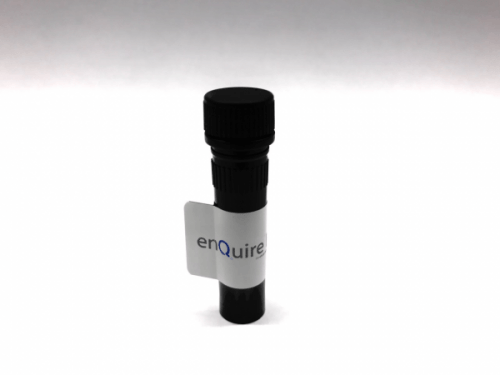Mouse KLK-8 / Kallikrein-8 Recombinant Protein Product Attributes
Product Type: Recombinant Protein
Recombinant KLK-8 / Kallikrein-8 based upon sequence from Mouse
Host: QP9804 protein expressed in Yeast.
Tag: His
Protein Construction: A DNA sequence encoding the Mus musculus (Mouse) KLK-8 / Kallikrein-8, was expressed in the hosts and tags indicated. Please select your host/tag option, above.
Recommended Applications: Immunogen, Protein Standard, Cell culture, or Other Cell Biology Applications.
Application Notes: Please contact us for application specific information for QP9804.
Bioactivity Data: Untested
Full Length? Full Length of Mature Protein
Expression Region: Ile33 – Asp260
Amino Acid Sequence: ILEGRECIPH SQPWQAALFQ GERLICGGVL VGDRWVLTAA HCKKQKYSVR LGDHSLQSRD QPEQEIQVAQ SIQHPCYNNS NPEDHSHDIM LIRLQNSANL GDKVKPVQLA NLCPKVGQKC IISGWGTVTS PQENFPNTLN CAEVKIYSQN KCERAYPGKI TEGMVCAGSS NGADTCQGDS GGPLVCDGML QGITSWGSDP CGKPEKPGVY TKICRYTTWI KKTMDNRD
Purity: Greater than 94.7% as determined by SDS-PAGE.
Reconstitution Instructions: Concentrated protein in liquid format. Reconstitution is not necessary.
Concentration of Mouse KLK-8 / Kallikrein-8 Protein:
Endotoxin Levels: Not determined.
Buffer: Tris-based buffer, 50% glycerol
Storage Conditions: Store at -20C to -80C.
| Recombinant Mouse KLK-8 / Kallikrein-8 Protein General Information | |
|---|---|
| Curated Database and Bioinformatic Data | |
| Gene Symbol | Klk8 |
| Entrez Gene ID | 259277 |
| Ensemble Gene ID | ENSMUSG00000064023 |
| RefSeq Protein Accession(s) | NP_001311327.1 |
| RefSeq mRNA Accession(s) | NM_001324398.1, NM_008940.3 |
| UniProt ID(s) | Q61955 |
| UniGene ID(s) | Mm.458023 |
| COSMIC ID Link(s) | Klk8 |
| KEGG Gene ID(s) | mmu:259277 |
| General Description of Recombinant Mouse KLK-8 / Kallikrein-8 Protein. | |
| Serine protease which is capable of degrading a number of proteins such as casein, fibrinogen, kininogen, fibronectin and collagen type IV. Also cleaves L1CAM in response to increased neural activity. Induces neurite outgrowth and fasciculation of cultured hippocampal neurons. Plays a role in the formation and maturation of orphan and small synaptic boutons in the Schaffer-collateral pathway, regulates Schaffer-collateral long-term potentiation in the hippocampus and is required for memory acquisition and synaptic plasticity. Involved in skin desquamation and keratinocyte proliferation. Plays a role in the secondary phase of pathogenesis following spinal cord injury | |
Limitations and Performance Guarantee
This is a life science research product (for Research Use Only). This product is guaranteed to work for a period of two years when stored at -70C or colder, and one year when aliquoted and stored at -20C.




There are no reviews yet.